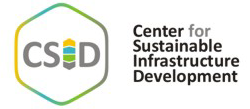
Friday, January 1th 2022
Indonesia has been appointed to be the presidency at the G20 2022. The official opening ceremony of the G20 activities in Indonesia in 2022 has also been held at the Jakarta National Monument on December 1, 2021. For similar purposes with G20, the UN Climate Change Conference (COP26) in Glasgow was held with all stakeholders brought together to accelerate common actions toward the goals of the Paris Agreement and the United Nations Framework Convention on Climate Change. These two activities have the same vision, it must be present inclusively to promote and act on the spirit of a sustainable global recovery.
Mohammed Ali Berawi, Director of CSID made an opinion on the thejakartapost.com page on issues regarding sustainability during the Covid-19 pandemic. According to Ali Berawi as a result of the pandemic, many governments require prompt actions in supporting their country’s health and economic resilience, including conducting vaccination, protecting workers and businesses, and empowering the vulnerable through adequate social protection. Thus, an international commitment to ensure adequate financing to contain the pandemic and protect people, exchange clinical data and share medical supplies and vaccines is important for strengthening global health systems.
On the other hand, global solidarity on supporting economic resilience is conducted through enhancing fiscal and debt management capacity, fair investment support and social protection to overcome the pandemic crisis.
Global cooperation is required in order to fight the COVID-19 pandemic, to enhance an inclusive and sustainable economy recovery, and to protect and regenerate nature. There are some recommendations for G20 agenda discussion, particularly in the role of science and technology in sustainable development and a need to strengthen international collaboration and cooperation.
Science and technology development plays a significant role in achieving sustainable development by improving the efficiency and efficacy of new and more sustainable approaches to development. Investment in green technology, efficient and effective processes, safer materials and improved performances and outcomes are some results of such development.
Technological development in utilizing renewable energy resources, building urban water systems and sustainable public infrastructure, increasing food production and producing environmentally friendly materials and goods are among the pathways by which technology will significantly contribute to achieving sustainable development targets.
Science and technology will assist us in tackling the pandemic by producing a suitable strategy for monitoring, treating, mitigating, and recovering from its impact. To anticipate such impact, a comprehensive plan is required for increasing the capacity for disruptions and surges in demand, especially for basic needs such as health and medicine, food, water and energy. The COVID-19 pandemic suggests the need to rethink the role of resilience knowledge and practices in order to ensure the performance of the built environment to meet the health-related criteria.
I propose the concept of Nature 5.0 as a balance between economic interest (Industry 5.0) and creative innovative – adaptive human being (Society 5.0) to regenerate nature. I argue that the concept of regenerating nature enables us to invent the technology as well as increase our quality of life that helps us to sustain the Earth as our living planet (Berawi, 2019). Human intervention with science and technology has altered the nature processes, from its creation stage (Nature 1.0), adaptation, evolution, to coalition (Nature 4.0).
After the existence of Earth (Nature 1.0), the adaptation stage is the process that makes organisms better suited to their habitat (Nature 2.0). Interactions between organisms produce evolutions of fitness (Nature 3.0), and over hundreds of years later, evolution has caused us to promote and share the Earth’s natural resources (Nature 4.0). The advancements in the technology revolution have allowed us to play a significant role in shaping and regenerating nature (Nature 5.0).
The technology development contributes to improving the global environment by producing green, resource-secure and inclusive economies for all. Thus, we need to create and utilize healthier and environmentally friendly technology in our basic needs fulfillment, e.g. food, housing and energy, to create sustainable smart cities and industrial development. The well-being of our future will be subjected to how we produce technology that can govern our climate, health, social equity and stability.
Technology can be used to mitigate and provide a solution for enhancing our quality of life by producing sustainable products and services. For example, by using an advanced information technology system, we are creating new ways to reduce transportation emissions and manage resource consumption, in a way that is better for the economy, community and environment.
Furthermore, digital technologies such as the Internet of Things (IoT), Artificial Intelligence (AI), data analytics, machine learning, 3D printing, etc., can be utilized to create, expand and monitor the effectiveness of sustainable development goals and environmental compliance across the globe. The technologies can be efficiently used to control and to improve required resources, energy, water and waste by connecting and automatically exchanging information via intra- and inter-systems.
I would like to highlight a need to carefully manage the social, environmental and economic dimensions of this crisis in order to enhance societies’ and countries’ resilience. The Sustainable Development Goals (SDGs) established actions to end poverty, improve health and education, and promote prosperity and well-being by considering environmental sustainability, which requires value changes, institutional changes and cultural adjustment.
Partnership and collaborative processes from all stakeholders are required to enhance the acceleration and adoption of technologies for environmental regeneration and quality of life improvement. In this context, policymakers, business practitioners, scientists and smart societies are working together to add sustainable value to reinforce the positive aspects of technology’s effect on nature. As technology changes the way we live, it will continue to have a profound impact on the way we regenerate and protect our environmental sustainability.
Responses to COVID-19 have also prompted a strong drive to reduce unequal access to, and the quality of, public education and health facilities supported by government policies in order to increase the country’s resilience. Furthermore, this drive will prompt stronger support for small and medium enterprises through business incubators and start-up companies to ensure urban economic resilience. The future development is a model with an emphasis on innovation, inclusivity and sustainability. The world development agenda can be boosted by strengthened knowledge-sharing and collaboration among stakeholders in international contexts.
Therefore, G20 members need to commit to supporting the science and technology process and expanding access across countries members. The G20 needs to strengthen cooperation in order to overcome the pandemic and enhance science and technology contribution toward Nature 5.0.
source:
https://www.thejakartapost.com/opinion/2021/11/22/g20-cop26-and-sdgs-toward-nature-5-0.html

